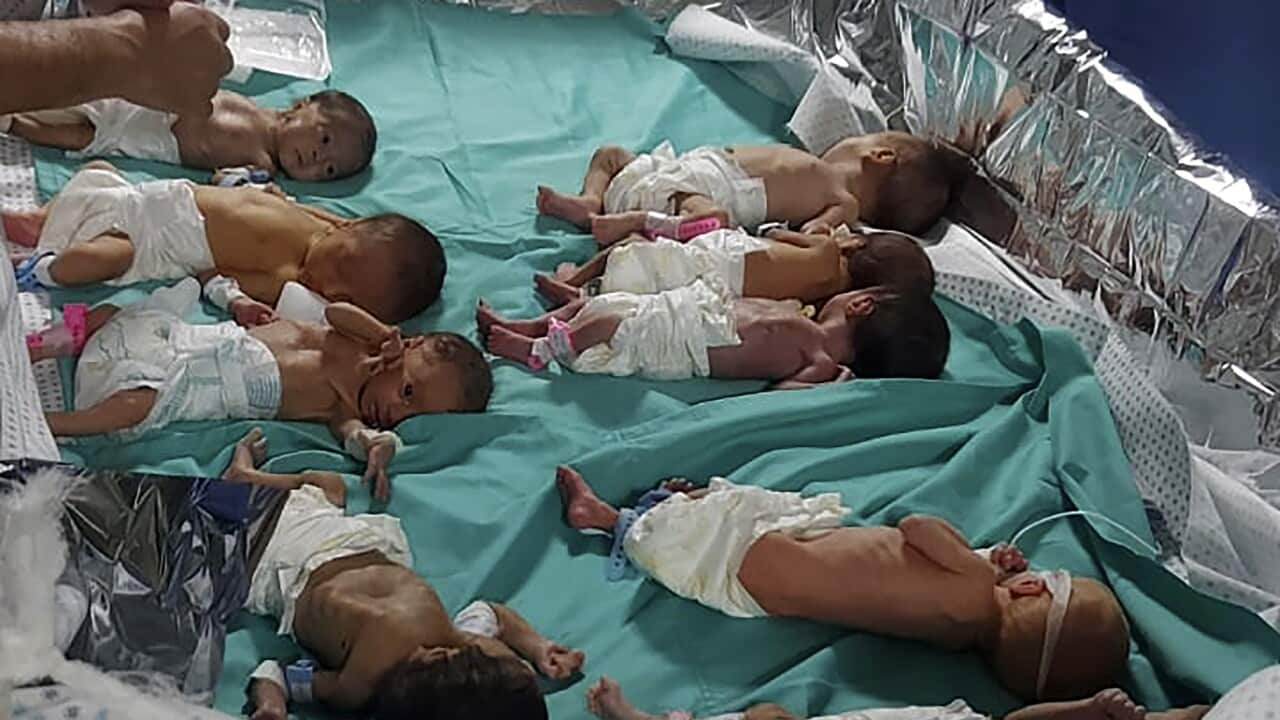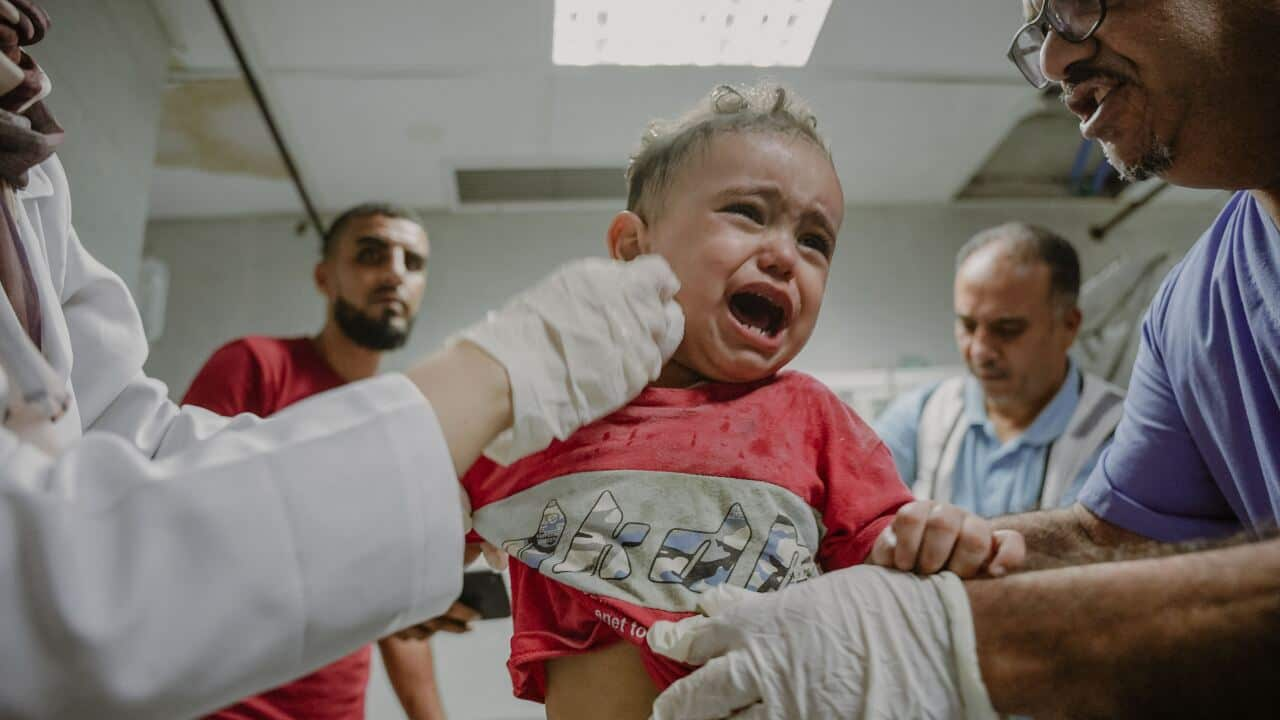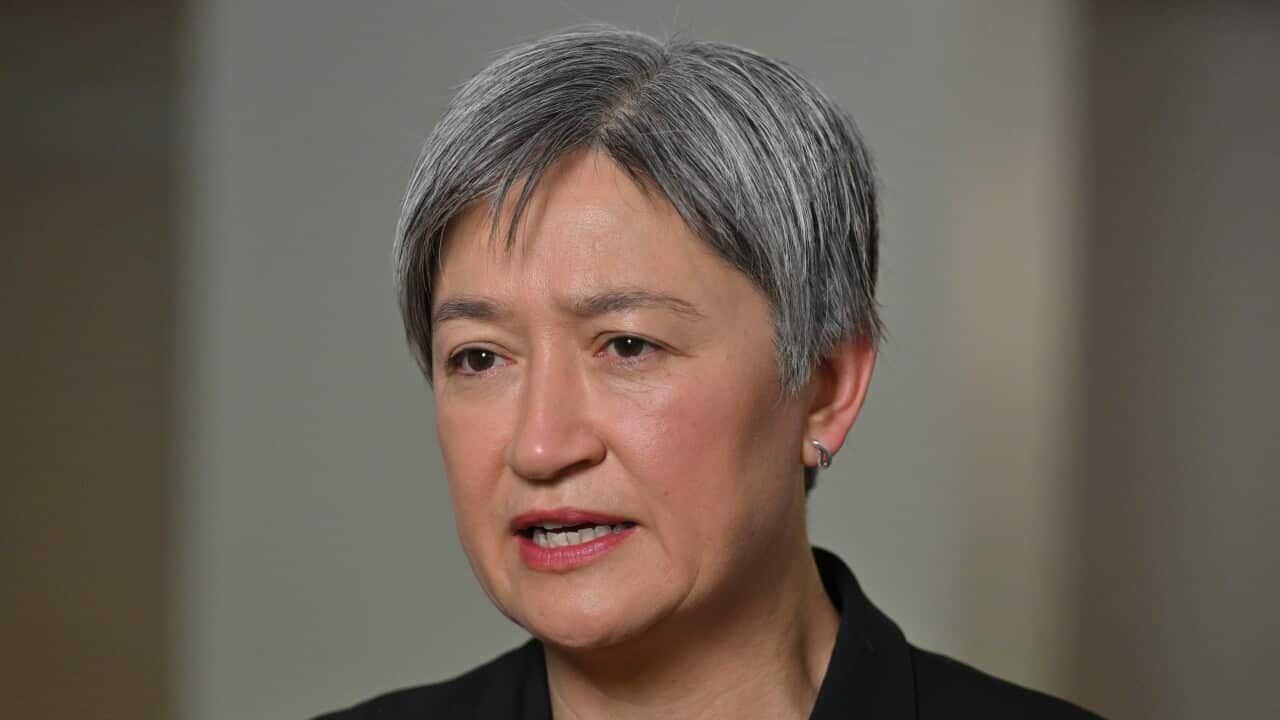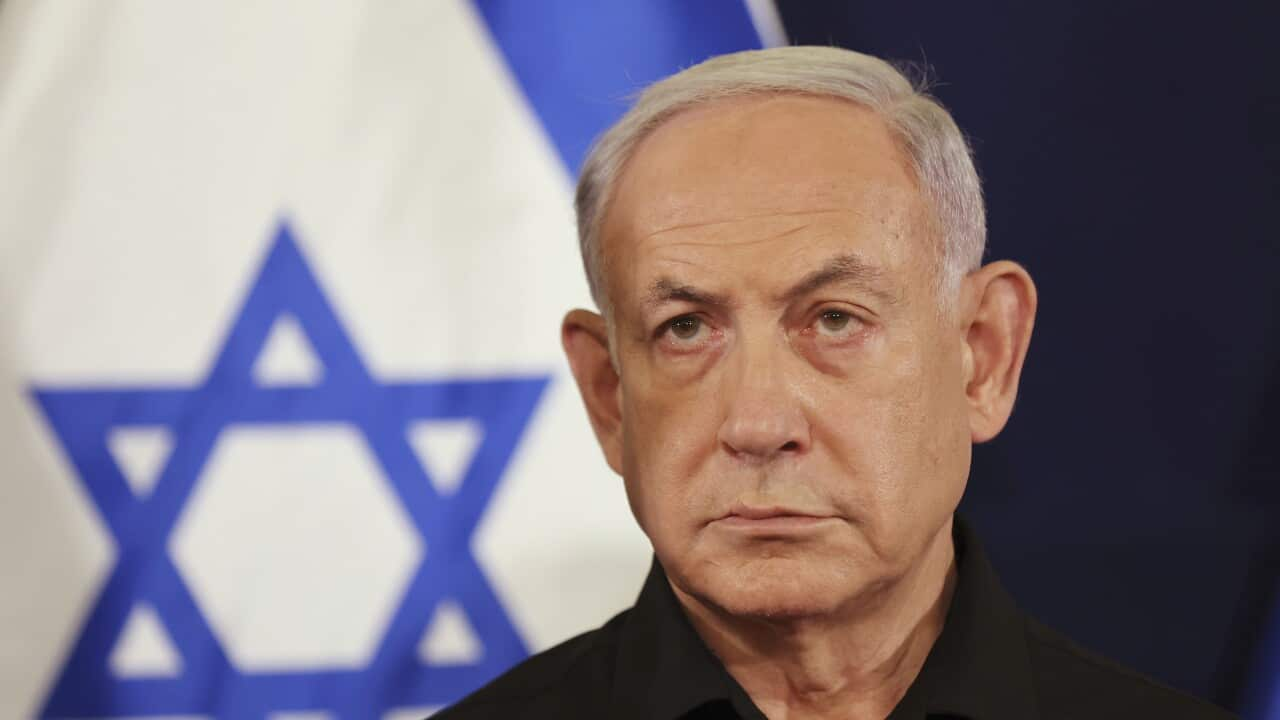Key Points
- Gaza health officials say Israeli forces, including tanks, are at the gates of Al-Shifa hospital.
- Hundreds of patients are still reportedly trapped in the hospital, waiting for evacuation.
- The United Nations said its Palestinian aid agency had run out of fuel, and would soon be forced to stop operating.
The tiny babies lie side by side, some wrapped in green fabric roughly taped around them for warmth, others wearing only nappies, a picture of vulnerability, their lives in grave danger with every minute that passes.
The newborns are under the care of exhausted medics at Gaza's Al Shifa hospital, which is besieged by Israeli tanks battling Hamas fighters, and lacks electricity, water, food, medicines and equipment.
"Yesterday I had 39 babies and today they have become 36," said Dr Mohamed Tabasha, head of the paediatric department at Al Shifa, in a telephone interview on Monday.
"I cannot say how long they can last. I can lose another two babies today, or in an hour," he said.
The premature babies, who weigh less than 1.5 kg each and in some cases only 700 or 800 grams, should be in incubators where the temperature and humidity can be regulated according to their individual needs.
Instead, they had to be moved to ordinary beds over the weekend because of a shortage of electricity, said Tabasha. They were placed side by side, surrounded by packets of nappies, cardboard boxes of sterile gauze and plastic bags.
"I never expected in my life that I would put 39 babies side by side on a bed, each with a different disease, and in this acute shortage of medical staff, of milk," Tabasha said.
The infants are too cold, and the temperature is not stable because of power cuts, he said. In the absence of infection control measures, they are transmitting viruses to each other and they have no immunity.
He said there was no longer any way of sterilising their milk and bottle teats to the required standard. As a result, some had contracted gastritis and were suffering from diarrhoea and vomiting, which meant an acute risk of dehydration.
'Very critical cases'
Dr Ahmed El Mokhallalati, also involved in caring for the babies, described the conditions as deadly.
"They are in a very bad situation where you slowly kill them unless someone interferes to adjust or to improve their situation," he said, also by telephone from Al Shifa.
"These are very critical kinds of cases, where you have to be very sensitive in dealing with them. You have to take care of each of them in a very special way. Currently they are all in open space, they are all with each other," he said.
Tabasha listed everything he would need to keep the babies safe: electricity to run the incubators, a proper steriliser for the milk and bottle teats, medicines, and support machines in case any of them went into respiratory failure.
He said the situation was harrowing for the doctors and the four nurses in charge of the babies.
"We are exhausted emotionally and physically," he said.

Premature babies at Al-Shifa Hospital in the Gaza Strip on Saturday. Source: Getty / Al-Shifa Hospital/Anadolu Agency
Gaza health ministry spokesperson Ashraf Al-Qidra, who was inside the hospital, said 32 patients had died in the past three days, including the three newborn babies, as a result of the siege of the hospital and lack of power.
At least 650 patients were still inside, desperate to be evacuated to another medical facility by the Red Cross or some other neutral agency. Israel says the hospital sits atop tunnels housing a headquarters for Hamas fighters using patients as shields, which Hamas denies.
Hamas is a Palestinian military and political group, which has gained power in the Gaza Strip since winning legislative elections there in 2006. Its stated aim is to establish a Palestinian state, while refusing to recognise Israel's right to exist.
Hamas, in its entirety, is designated as a terrorist organisation by countries including Australia, Canada, the UK and the US. New Zealand and Paraguay list only its military wing as a terrorist group. In 2018, the United Nations General Assembly voted against a resolution condemning Hamas in its entirety as a terrorist organisation.
Al-Shifa under 'blockade'
"The tanks are in front of the hospital. We are under full blockade. It's a totally civilian area. Only hospital facility, hospital patients, doctors and other civilians (are) staying in the hospital. Someone should stop this," a surgeon at the hospital, El Mokhallalati said.
"They bombed the (water) tanks, they bombed the water wells, they bombed the oxygen pump as well. They bombed everything in the hospital. So we are hardly surviving.
"We tell everyone, the hospital is no more a safe place for treating patients. We are harming patients by keeping them here."
US President Joe Biden said on Monday that al-Shifa hospital must be protected and he hoped there would be less intrusive action there.
There was also fresh concern that the war could spread beyond Gaza, with an upsurge of clashes on Israel's northern border with Lebanon, and the US launching air strikes on Iran-linked militia targets in neighbouring Syria.
Israel has bombarded Gaza since in which more than 1,200 people were killed, according to the Israeli government, and over 200 hostages taken.
More than 11,000 people have been killed in Gaza since 7 October, about 40 per cent of them children, according to the health ministry in Hamas-controlled Gaza.
Since Israeli ground forces entered Gaza in late October and quickly surrounded Gaza City, fighting has been concentrated in a tightening circle around al-Shifa hospital.
Qidra said an Israel tank was now stationed at the hospital gate.
Israeli snipers and drones were firing into the hospital, making it impossible for medics and patients to move around.
"We are besieged and are inside a circle of death," he said.
Israel has told civilians to leave and medics to send patients elsewhere.
It says it has attempted to evacuate babies from the neo-natal ward and left 300 litres of fuel to power emergency generators at the hospital entrance, but the offers were blocked by Hamas.
El Mokhallalati, the surgeon, said premature babies that would normally be in individual incubators were being lined up eight to a bed, kept warm with whatever power was left.
After three died there were 36 alive in the neo-natal unit, he said. "We are expecting to lose more of them, day by day," he added.
Al-Quds hospital surrounded
Fighting also took place at a second major hospital in northern Gaza, al-Quds, which has also stopped functioning.
The Palestinian Red Crescent said the hospital was surrounded by heavy gunfire, and a convoy sent to evacuate patients and staff had been unable to reach it.
Israel said it had killed "approximately 21 terrorists" at al-Quds in return fire after fighters shot from the hospital entrance.
It released footage purporting to show a group of men at the hospital gate, one of whom appeared to be carrying a rocket-propelled grenade launcher.
The United Nations' Palestinian aid agency UNRWA is now housing around 800,000 people in Gaza, or half of those made homeless by the fighting. It said its emergency fuel depot for the enclave had finally run dry and it would soon be unable to run ambulances, resupply hospitals, provide drinking water or pump sewage.
UN agencies observed a minute's silence on Monday for 101 staff members killed so far in Gaza, the largest toll of humanitarian workers since the UN was founded in the ashes of World War Two.














